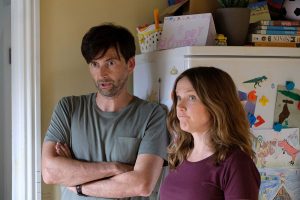 Parents David Tennant as Simon and Jessica Hynes as Emily are shown coping – and not coping
Parents David Tennant as Simon and Jessica Hynes as Emily are shown coping – and not coping
Telling it like it is – There She Goes BBC 4, October-November 2018 TV Review
A darkly comic drama showing what it’s like to raise a child with a learning disability is an honest, refreshing alternative to the usual schmaltzy family stories, says Tracey Harding
A drama/comedy about a family whose nine-year-old daughter Rose has profound learning disabilities was in turn emotionally heart wrenching and laugh-out-loud funny.
Shaun Pye’s drama series There She Goes is based on his experiences of bringing up his daughter, who has an undiagnosed chromosomal disorder, and opened with ‘One day in the life of Rosie Yates’.
Pye has an illustrious pedigree as a writer for 8 Out of 10 Cats and The Jonathan Ross Show, as well as acting credentials on Extras with Ricky Gervais.His decision to write the series as comic drama makes the subject matter accessible to a TV audience, and reflects Pye’s experiences of parenting a child with learning disabilities being in equal parts dramatic struggle and comedy.
As Pye himself says: “It’s not a generalised story about disability. This sitcom doesn’t speak about any other parents’ experiences. There She Goes is a very authored piece. All I can do is tell my story as truthfully as I can” (Interview with BBC Media, 8 October 2018).
There She Goes is blessed with a stellar cast featuring David Tennant as Simon and Jessica Hynes as Emily, the beleaguered parents of Rosie, played with emotional intensity by Miley Locke.
The story knits together two timelines, past and present. The first focuses on the birth of Rosie and the heartbreaking realisation for Simon and Emily that something is wrong with their daughter.
Hynes gives a wonderful performance as she struggles to make sense of what is happening, and tries to convince her mother and health professionals that her feelings are not just those of an overtired new mother.
The second timeline brings us up to date with the family coping – or often not coping – on a day-to-day basis. They have developed their own ways of dealing with Rosie, including ignoring her, drinking copious amounts of wine and, most effectively, bribing her with Mini Cheddars. Miley Locke is compelling as Rosie and, although she is not a learning disabled actor, she is entirely convincing,
In his interview with BBC Media, Pye was asked whether a girl with a learning disability could have been cast. He said they had consulted professionals and been told that it would be too much for someone with a learning disability, as the demands on set are very tough.
I feel that given recent performances by actors with learning disabilities in recent TV dramas, it would have been an ideal opportunity to showcase the talents of one of the many young learning disabled actors who are eager for a chance to shine.
Bleak humour
The script is peppered with humour that at times could be viewed as politically incorrect. In a conversation with Simon as they watch bands on TV, Emily says “I love Simple Minds”, to which Simon replies “Please don’t talk about Rosie like that”.
This takes some getting used to initially, but the quality and strength of the writing ensure we are aware that, in the context of Simon’s life, these remarks are part of his coping mechanism and his shield against the reality of living with and loving his difficult daughter.
Whatever is said makes us aware that, like so many families in similar situations, each person gets through things in their own way, and we are never in doubt this is a story about love.
Pye has succeeded in writing an honest portrayal of life with a disabled child which, while dealing with a specific experience, has captured the emotions that will ring true with a wide audience of parents who are trying to do their best.
There She Goes is a refreshing alternative to schmaltzy family dramas and, with a child with learning disabilities as the central character, it is good to see this shown. It is commendable that the public has been presented with a series bold enough to tackle the anger and disappointment, as well as the humour and joy, of life with a child who has severe learning disabilities.
